文学术语词典
- 格式:doc
- 大小:59.50 KB
- 文档页数:14
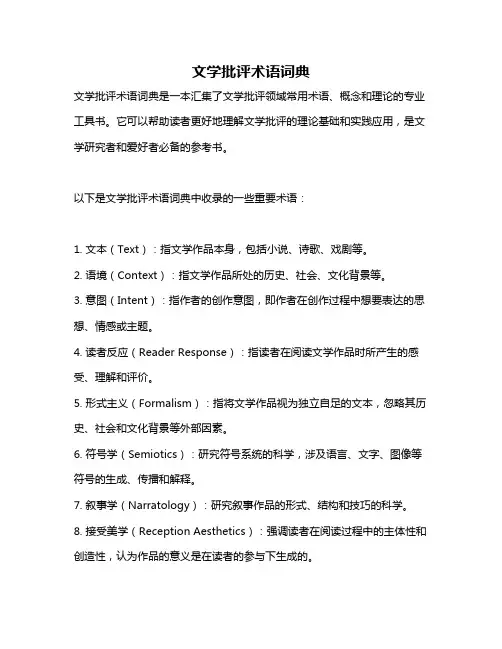
文学批评术语词典
文学批评术语词典是一本汇集了文学批评领域常用术语、概念和理论的专业工具书。
它可以帮助读者更好地理解文学批评的理论基础和实践应用,是文学研究者和爱好者必备的参考书。
以下是文学批评术语词典中收录的一些重要术语:
1. 文本(Text):指文学作品本身,包括小说、诗歌、戏剧等。
2. 语境(Context):指文学作品所处的历史、社会、文化背景等。
3. 意图(Intent):指作者的创作意图,即作者在创作过程中想要表达的思想、情感或主题。
4. 读者反应(Reader Response):指读者在阅读文学作品时所产生的感受、理解和评价。
5. 形式主义(Formalism):指将文学作品视为独立自足的文本,忽略其历史、社会和文化背景等外部因素。
6. 符号学(Semiotics):研究符号系统的科学,涉及语言、文字、图像等符号的生成、传播和解释。
7. 叙事学(Narratology):研究叙事作品的形式、结构和技巧的科学。
8. 接受美学(Reception Aesthetics):强调读者在阅读过程中的主体性和创造性,认为作品的意义是在读者的参与下生成的。
9. 结构主义(Structuralism):将文学作品视为一个整体,研究其内在的结构、关系和规律。
10. 后结构主义(Poststructuralism):对结构主义的批判和超越,强调个体主体性和文本的开放性。
这只是一小部分文学批评术语的示例,实际上,文学批评领域的术语极为丰富多样。
文学批评术语词典将会对深入理解文学批评的概念和理论提供极大的帮助。
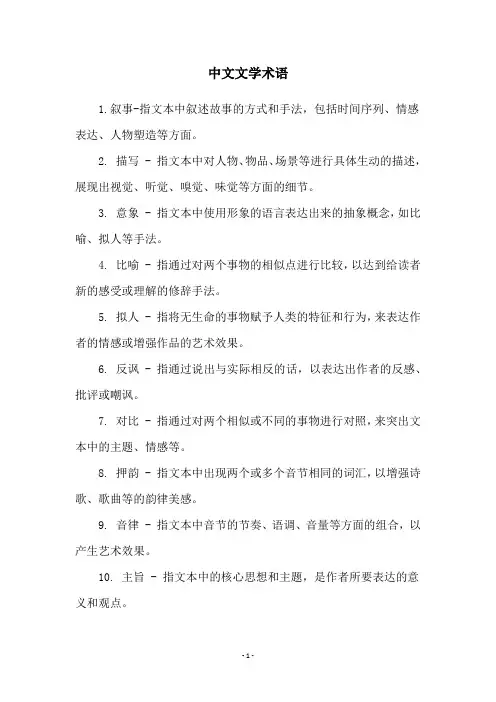
中文文学术语
1.叙事-指文本中叙述故事的方式和手法,包括时间序列、情感表达、人物塑造等方面。
2. 描写 - 指文本中对人物、物品、场景等进行具体生动的描述,展现出视觉、听觉、嗅觉、味觉等方面的细节。
3. 意象 - 指文本中使用形象的语言表达出来的抽象概念,如比喻、拟人等手法。
4. 比喻 - 指通过对两个事物的相似点进行比较,以达到给读者新的感受或理解的修辞手法。
5. 拟人 - 指将无生命的事物赋予人类的特征和行为,来表达作者的情感或增强作品的艺术效果。
6. 反讽 - 指通过说出与实际相反的话,以表达出作者的反感、批评或嘲讽。
7. 对比 - 指通过对两个相似或不同的事物进行对照,来突出文本中的主题、情感等。
8. 押韵 - 指文本中出现两个或多个音节相同的词汇,以增强诗歌、歌曲等的韵律美感。
9. 音律 - 指文本中音节的节奏、语调、音量等方面的组合,以产生艺术效果。
10. 主旨 - 指文本中的核心思想和主题,是作者所要表达的意义和观点。
- 1 -。
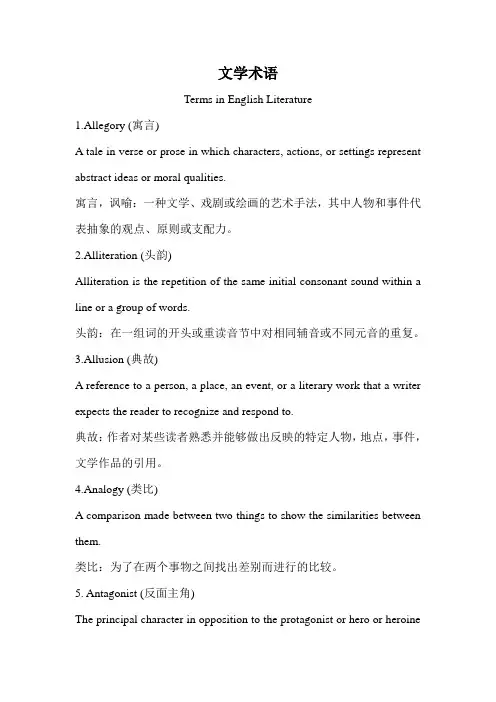
文学术语Terms in English Literature1.Allegory (寓言)A tale in verse or prose in which characters, actions, or settings represent abstract ideas or moral qualities.寓言,讽喻:一种文学、戏剧或绘画的艺术手法,其中人物和事件代表抽象的观点、原则或支配力。
2.Alliteration (头韵)Alliteration is the repetition of the same initial consonant sound within a line or a group of words.头韵:在一组词的开头或重读音节中对相同辅音或不同元音的重复。
3.Allusion (典故)A reference to a person, a place, an event, or a literary work that a writer expects the reader to recognize and respond to.典故:作者对某些读者熟悉并能够做出反映的特定人物,地点,事件,文学作品的引用。
4.Analogy (类比)A comparison made between two things to show the similarities between them.类比:为了在两个事物之间找出差别而进行的比较。
5. Antagonist (反面主角)The principal character in opposition to the protagonist or hero or heroineof a narrative or drama.反面主角:叙事文学或戏剧中与男女主人公或英雄相对立的主要人物。
6. Antithesis (对仗)The balancing of two contrasting ideas, words, or sentences.对仗:两组相对的思想,言辞,词句的平衡。

文学理论名词解释文学作为一门综合性学科,涵盖了丰富的理论体系和名词术语。
以下是对几个常见文学理论名词的解释。
1. 传统文学:传统文学是指以传统为基础的文学作品,它包括具有历史悠久的文化传统和价值体系的文学作品。
传统文学是一个国家或地区文化的重要组成部分,它承载着丰富的民族智慧和文化传承。
2. 恐怖主义:恐怖主义是一种文学创作风格,以探索人类心灵的恐惧与邪恶为主题。
这种文学作品通常通过描述恐怖和可怕的场景,展示人类内心的黑暗面,引发读者的恐慌和恐惧。
3. 解构主义:解构主义是一种批评理论,旨在揭示文本的内部矛盾、不稳定和多义性。
它强调语言的不确定性和无法确定的意义,通过对文本进行分析和反思,揭示隐含的权力关系和主导意识形态。
4. 启示文学:启示文学是指通过对神秘、超自然和灵感的探索,提供人类教诲和指导的文学作品。
这种文学作品通常涉及到宗教、神话和奇迹等元素,以展现人类灵魂的拯救和超越。
5. 后现代主义:后现代主义是对现代主义的回应和批判,它强调多样性、相对性和破碎性。
后现代主义的文学作品通常采用碎片化的叙事结构、模拟和拼贴等技巧,反映了当代社会的混乱和无序。
6. 关联主义:关联主义是一种文学流派,强调文本中的意象、象征和隐喻。
通过将不同的意象相互联系,关联主义试图传递出文学作品深层次的主题和情感。
7. 同情文学:同情文学是一种以表达同情和共鸣情感为目的的文学作品。
它通常关注社会弱势群体的遭遇和苦难,通过展示人性的善良和人道主义的情感,呼吁读者关注社会的不公和不平等。
8. 文化研究:文化研究是对文化现象和文化表达的跨学科研究领域。
它关注文化的产生、传播和演变,并探讨文化与权力、性别、种族等因素的相互关系。
文化研究旨在揭示文化的意义和社会的文化动态。
以上是对几个常见文学理论名词的简要解释,每个名词都有其独特的含义和研究领域。
深入理解这些概念可以帮助我们更好地理解和分析文学作品,并提高对文学的欣赏和理解能力。
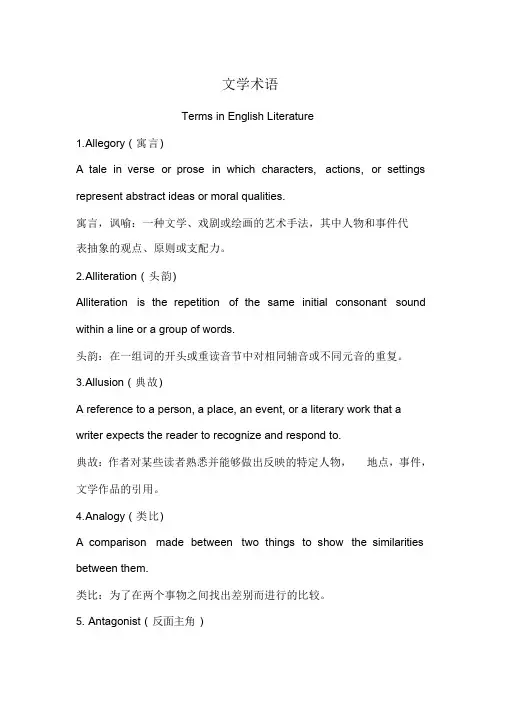
文学术语Terms in English Literature1. A llegory ( 寓言)A tale in verse or prose in which characters, actions, or settings represent abstract ideas or moral qualities.寓言,讽喻:一种文学、戏剧或绘画的艺术手法,其中人物和事件代表抽象的观点、原则或支配力。
2. A lliteration ( 头韵)Alliteration is the repetition of the same initial consonant sound within a line or a group of words.头韵:在一组词的开头或重读音节中对相同辅音或不同元音的重复。
3. A llusion ( 典故)A reference to a person, a place, an event, or a literary work that a writer expects the reader to recognize and respond to.典故:作者对某些读者熟悉并能够做出反映的特定人物,地点,事件,文学作品的引用。
4. A nalogy ( 类比)A comparison made between two things to show the similarities between them.类比:为了在两个事物之间找出差别而进行的比较。
5. Antagonist ( 反面主角)The principal character in opposition to the protagonist or hero or heroine of a narrative or drama.反面主角:叙事文学或戏剧中与男女主人公或英雄相对立的主要人物。
6. Antithesis ( 对仗)The balancing of two contrasting ideas, words, or sentences.对仗:两组相对的思想,言辞,词句的平衡。
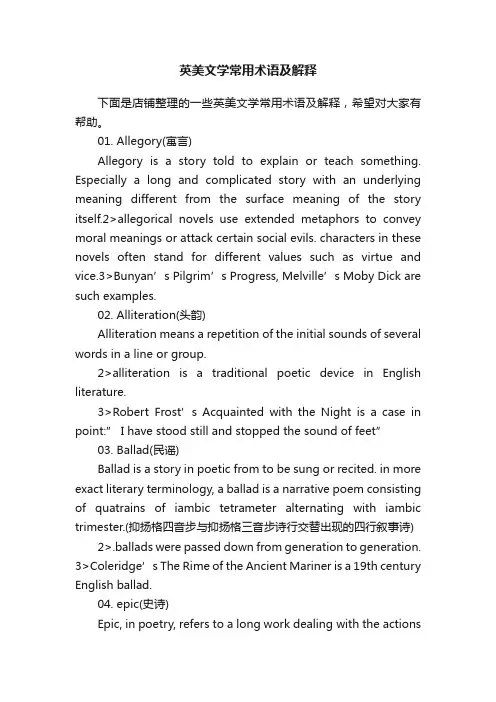
英美文学常用术语及解释下面是店铺整理的一些英美文学常用术语及解释,希望对大家有帮助。
01. Allegory(寓言)Allegory is a story told to explain or teach something. Especially a long and complicated story with an underlying meaning different from the surface meaning of the story itself.2>allegorical novels use extended metaphors to convey moral meanings or attack certain social evils. characters in these novels often stand for different values such as virtue and vice.3>Bunyan’s Pilgrim’s Progress, Melville’s Moby Dick are such examples.02. Alliteration(头韵)Alliteration means a repetition of the initial sounds of several words in a line or group.2>alliteration is a traditional poetic device in English literature.3>Robert Frost’s Acq uainted with the Night is a case in point:” I have stood still and stopped the sound of feet”03. Ballad(民谣)Ballad is a story in poetic from to be sung or recited. in more exact literary terminology, a ballad is a narrative poem consisting of quatrains of iambic tetrameter alternating with iambic trimester.(抑扬格四音步与抑扬格三音步诗行交替出现的四行叙事诗)2>.ballads were passed down from generation to generation.3>Coleridge’s The Rime of the Ancient Mariner is a 19th century English ballad.04. epic(史诗)Epic, in poetry, refers to a long work dealing with the actionsof goods and heroes.2>Epic poems are not merely entertaining stories of legendary or historical heroes; they summarize and express the nature or ideals of an entire nation at a significant or crucial period of its history.3>Beowulf is the greatest national Epic of the Anglo-Saxons.05. Lay(短叙事诗)It is a short poem, usually a romantic narrative, intended to be sung or recited by a minstrel.06. Romance(传奇)Romance is a popular literary form in the medic England.2>it sings knightly adventures or other heroic deeds.3>chivalry is the spirit of the romance.07. Alexandrine(亚历山大诗行)The name is derived from the fact that certain 12th and 13th century French poems on Alexander the Great were written in this meter.2>it is an iambic line of six feet, which is the French heroic verse.08. Blank Verse(无韵诗或素体广义地说)Blank verse is unrhymed poetry. Typically in iambic pentameter, and as such, the dominant verse forms of English dramatic and narrative poetry since the mid-16th century.09. Comedy(喜剧)Comedy is a light form of drama that aims primarily to amuse and that ends happily. Since it strives to provoke smile and laughter, both wit and humor are utilized. In general, the comic effect arises from recognition of some incongruity of speech, action, or character revelation, with intricate plot.10. Essay(随笔)The term refers to literary composition devoted to the presentation of the writer’s own ideas on a topic and generally addressing a particular aspect of the subject. Often brief in scope and informal in style, the essay differs from such fomal forms as the thesis, dissertation or treatise.11. Euphuistic style(绮丽体)Its principle characteristics are the excessive use of antithesis, which is pursued regardless of sense, and emphasized by alliteration and other devices; and of allusions to historical and mythological personages and to natural history drawn from such writers as Plutarch(普卢塔克), Pliny(普林尼), and Erasmus(伊拉兹马斯).2>it is the peculiar style of Euphues(优浮绮斯)12. History Plays(历史剧)History plays aim to present some historical age or character, and may be either a comedy or a tragedy. They almost tell stories about the nobles, the true people in history, but not ordinary people. the principle idea of Shakespeare’s history plays is the necessity for national unity under a mighty and just sovereign.13. Masques or Masks(假面剧)Masques (or Masks) refer to the dramatic entertainments involving dances and disguises, in which the spectacular and musical elements predominated over plot and character. As they were usually performed at court, often at very great expense, many have political overtones.14. Morality plays(道德剧)A kind of medic and early Renaissance drama that presents the conflict between the good and evil through allegorical characters. The characters tend to be personified abstractions of vices and virtues, which can be named as Mercy. Conscience, etc. unlike a mystery or a miracle play, morality play does notnecessarily use Biblical or strictly religious material because it takes place internally and psychologically in every human being.15.Sonnet(十四行诗)It is a lyric poem of 14 lines with a formal or recited and characterized by its presentation of a dramatic or exciting episode in simple narrative form.2>it is one of the most conventional and influential forms of poetry in Europe.3>Shakespeare’s sonnets are well-known.16. Spenserian Stanza(斯宾塞诗节)Spenserian Stanza is the creation of Edmund spenser.2>it refers to a stanza of nine lines, with the first eight lines in iambic pentameter(五音步抑扬格) and the last line in iambic hexameter(六音步抑扬格),rhyming ababbcbcc. 3>Spenser’s the Faerie Queen was written in this kind of stanza.17. Stanza(诗节)Stanza is a group of lines of poetry, usually four or more, arranged according to a fixed plan.2>the stanza is the unit of structure in a poem and poets do not vary the unit within a poem.18. Three Unities(三一原则)Three rules of 16th and 17th century Italian and French drama, broadly adapted from Aristotle’s Poetics<诗学>:2>the unity of time, which limits a play to a single day; the unity of place, which limits a play’s setting in a single location; and the unity of action, which limits a play to a single story line.19. Tragedy(悲剧)In general, a literary work in which the protagonist meets an unhappy or disastrous end. Unlike comedy, tragedy depicts the actions of a central character who is usually dignified or heroic.20.Conceit(奇特比喻)Conceit is a far-fetched simile or metaphor, a literary conceit occurs when the speaker compares two highly dissimilar things.2>conceit is extensively employed in John Donne’s poetry.21.Metar(格律)The word”meter” is derived from the Greek word”metron” meaning”measure”.2>in English when applied to poetry, it refers to the regular pattern of stressed and unstressed syllables.3>the analysis of the meter is called scansion(格律分析)22. University Wits(大学才子)University Wits refer to a group of scholars during the Elizabethan Age who graduated from either oxford or Cambridge. They came to London with the ambition to become professional writers. Some of them later became famous poets and playwrights. They were called” University Wits”23.Foreshadowing(预兆)Foreshadowing, the use of hints or clues in a novel or drama to suggest what will happen next. Writers use Foreshadowing to create interest and to build suspense.method used to build suspense by providing hints of what is to come.24. Soliloquy(独白)Soliloquy, in drama, means a moment when a character is alone and speaks his or her thoughts aloud..2>the line“to be, or no t to be, that is the question”, which begins the famous soliloquy from Shakespeare’s Hamlet.25.Narrative Poem(叙述诗)Narrative Poem refers to a poem that tells a story in verse,2>three traditional types of narrative poems include ballads,epics, metrical romances.3>it may consist of a series of incidents, as John Milton’s paradise lost.26.Robin Hood(罗宾.豪)Robin hood is a legendary hero of a series of English ballads, some of which date from at least the 14th century.2>the character of Robin Hood is many-sided. Strong, brave and intelligent, he is at the same time tender-hearted and affectionate.3>the dominant key in his character is his hatred for the cruel oppression and his love for the poor and downtrodden.4>another feature of Robin’s view is his reverence for the king, Robin Hood was a people’s hero.27. Beowulf(贝奥武甫)Beowulf, a typical example of old English poetry, is regarded as the greatest national epic of t he Anglo-Saxons. 2>the epic describes the exploits of a Scandinavian hero, Beowulf, in fighting against the monster Grendel, his revengeful nother, and a fire-breathing dragon in his declining years. While fight against the dragon, Beowulf was mortally wounded, however, he killed the dragon at the cost of his life, Beowulf is shown not only as a glorious hero but also as a protector of the people.28. Baroque(巴罗克式风格)This is originally a term of abuse applied to 17th century Italian art and that of other countries. It is characterized by the unclassical use of classical forms, in a literary context; it is loosely used to describe highly ornamented verse or prose, abounding in extravagant conceits.这原本是用来指17世纪的意大利艺术和其他国家艺术滥用的一个术语.这种风格主要是指对古典形式的非古典运用.在文学领域,这种风格松散地用来指十分雕饰的,大量运用奇思妙想的诗歌或散文.29. Cavalier poets(骑士派诗人)A name given to supporters of Charles I in the civil war. These poets were not a formal group, but all influenced by Ben Jonson and like him paid little attention to the sonnet. Their lyrics are distinguished by short lines, precise but idiomatic diction, and an urbane and graceful wit.30. Elegy(挽歌)Elegy has typically been used to refer to reflective poems that lament the loss of something or someone, and characterized by their metrical form.31. Restoration Comedy(复辟时期喜剧)Restoration Comedy, also the comedy of manners, developed upon the reopening of the theatres after the re-establishment of monarchy with the return of Charles II.. Its predominant tone was witty, bawdy, cynical, and amoral. Standard characters include fops, bawds, scheming valets, country squires, and sexually voracious young widows and older women. The principle theme is sexual intrigue, either for its own sake or for money.复辟时期的喜剧,又称社会习俗讽刺喜剧,是在查理二世君主复辟后剧院重新开业的基础上发展起来的,其主要的基调是诙谐,淫秽,挖苦和非道德.标准的角色包括花花公子,鸨母,诡计多端的仆人,乡绅,性欲旺盛的年轻寡妇和老女人.主要的主题是奸情,有的是为了性,有的是为了钱.。
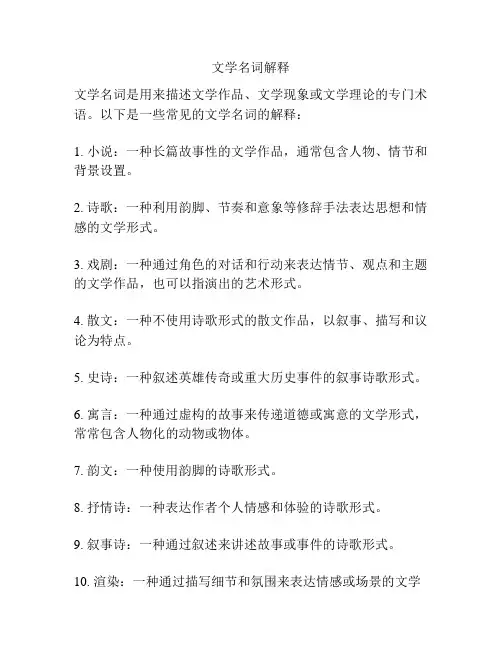
文学名词解释文学名词是用来描述文学作品、文学现象或文学理论的专门术语。
以下是一些常见的文学名词的解释:1. 小说:一种长篇故事性的文学作品,通常包含人物、情节和背景设置。
2. 诗歌:一种利用韵脚、节奏和意象等修辞手法表达思想和情感的文学形式。
3. 戏剧:一种通过角色的对话和行动来表达情节、观点和主题的文学作品,也可以指演出的艺术形式。
4. 散文:一种不使用诗歌形式的散文作品,以叙事、描写和议论为特点。
5. 史诗:一种叙述英雄传奇或重大历史事件的叙事诗歌形式。
6. 寓言:一种通过虚构的故事来传递道德或寓意的文学形式,常常包含人物化的动物或物体。
7. 韵文:一种使用韵脚的诗歌形式。
8. 抒情诗:一种表达作者个人情感和体验的诗歌形式。
9. 叙事诗:一种通过叙述来讲述故事或事件的诗歌形式。
10. 渲染:一种通过描写细节和氛围来表达情感或场景的文学技巧。
11. 刻画:一种通过描写人物的外貌、个性、思想和情感来使其栩栩如生的文学技巧。
12. 比喻:一种通过将一个事物与另一个事物进行类比来传递意义的修辞手法。
13. 暗示:一种通过暗示或间接暗示来传递意义或创造悬念的修辞手法。
14. 反讽:一种通过用词或语气的反差来传递愤怒、嘲笑或讽刺的修辞手法。
15. 典型:一种具有普遍性和代表性的文学人物、情节或主题。
16. 悬念:一种通过悬而未决的情节发展来引发读者的紧张感和好奇心的文学技巧。
17. 主题:一种作品中表达的基本思想、观点或价值观。
18. 道德:一种在作品中传递的道德准则或价值观。
19. 简洁:一种通过言简意赅地表达思想和情感的文学风格。
20. 风格:作家独特的写作方式,包括词语选择、句法结构和修辞手法等。
这些文学名词的解释可以帮助读者更好地理解和欣赏文学作品,同时也可以用于文学研究和批评中。
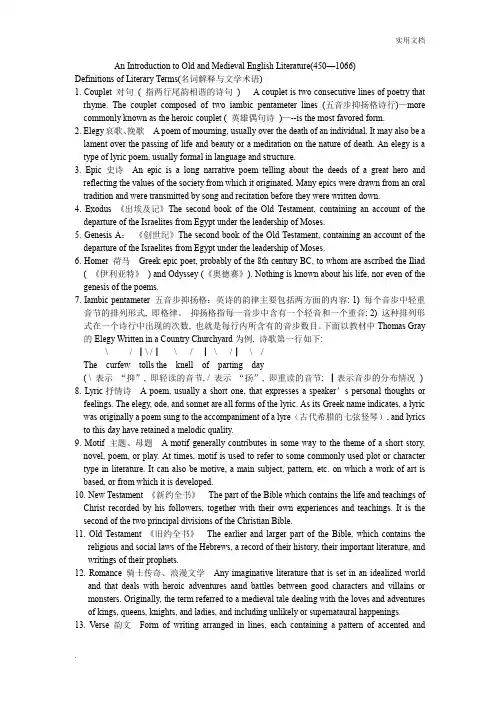
An Introduction to Old and Medieval English Literature(450—1066)Definitions of Literary Terms(名词解释与文学术语)1. Couplet 对句( 指两行尾韵相谐的诗句) A couplet is two consecutive lines of poetry that rhyme. The couplet composed of two iambic pentameter lines (五音步抑扬格诗行)—more commonly known as the heroic couplet ( 英雄偶句诗)—--is the most favored form.2. Elegy哀歌、挽歌 A poem of mourning, usually over the death of an individual. It may also be a lament over the passing of life and beauty or a meditation on the nature of death. An elegy is a type of lyric poem, usually formal in language and structure.3. Epic 史诗An epic is a long narrative poem telling about the deeds of a great hero and reflecting the values of the society from which it originated. Many epics were drawn from an oral tradition and were transmitted by song and recitation before they were written down.4. Exodus 《出埃及记》The second book of the Old Testament, containing an account of the departure of the Israelites from Egypt under the leadership of Moses.5. Genesis A:《创世纪》The second book of the Old Testament, containing an account of the departure of the Israelites from Egypt under the leadership of Moses.6. Homer 荷马Greek epic poet, probably of the 8th century BC, to whom are ascribed the Iliad ( 《伊利亚特》) and Odyssey (《奥德赛》). Nothing is known about his life, nor even of the genesis of the poems.7. Iambic pentameter 五音步抑扬格:英诗的韵律主要包括两方面的内容: 1) 每个音步中轻重音节的排列形式, 即格律。
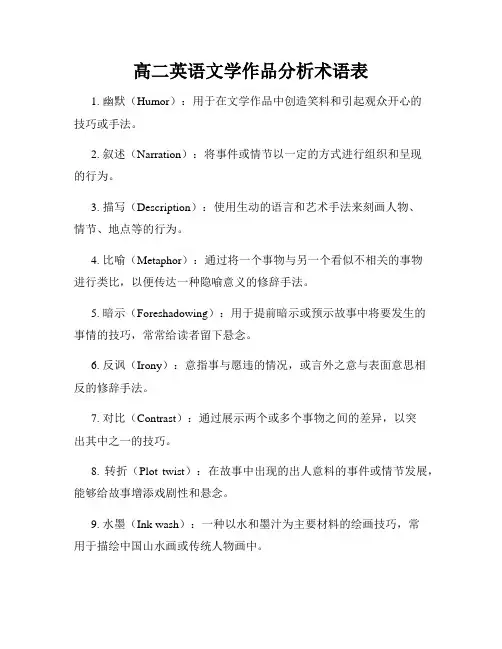
高二英语文学作品分析术语表1. 幽默(Humor):用于在文学作品中创造笑料和引起观众开心的技巧或手法。
2. 叙述(Narration):将事件或情节以一定的方式进行组织和呈现的行为。
3. 描写(Description):使用生动的语言和艺术手法来刻画人物、情节、地点等的行为。
4. 比喻(Metaphor):通过将一个事物与另一个看似不相关的事物进行类比,以便传达一种隐喻意义的修辞手法。
5. 暗示(Foreshadowing):用于提前暗示或预示故事中将要发生的事情的技巧,常常给读者留下悬念。
6. 反讽(Irony):意指事与愿违的情况,或言外之意与表面意思相反的修辞手法。
7. 对比(Contrast):通过展示两个或多个事物之间的差异,以突出其中之一的技巧。
8. 转折(Plot twist):在故事中出现的出人意料的事件或情节发展,能够给故事增添戏剧性和悬念。
9. 水墨(Ink wash):一种以水和墨汁为主要材料的绘画技巧,常用于描绘中国山水画或传统人物画中。
10. 反派角色(Antagonist):故事中与主人公发生冲突或是主要阻碍主人公实现目标的角色。
11. 意象(Imagery):通过艺术化的文字描述,使读者能够感觉到故事中的画面、声音、味道、触感等。
12. 主题(Theme):文学作品或故事中探讨的中心思想、观点或教训。
13. 隐喻(Symbolism):使用一个事物来代表另一个或多个更深远的含义的修辞手法。
14. 直喻(Simile):通过明确地使用“像”或其他比较性词语来进行比较的修辞手法。
15. 快节奏(Fast-paced):用来描述故事发展迅速,情节紧凑,节奏感强的作品。
16. 指代(Reference):通过使用代词或其他词语来指代先前已提及的事物。
17. 情感描写(Emotional description):描述人物内心感受或情绪状态的文学技巧。
18. 反英雄(Anti-hero):具有明显缺点或矛盾性格的主人公角色。
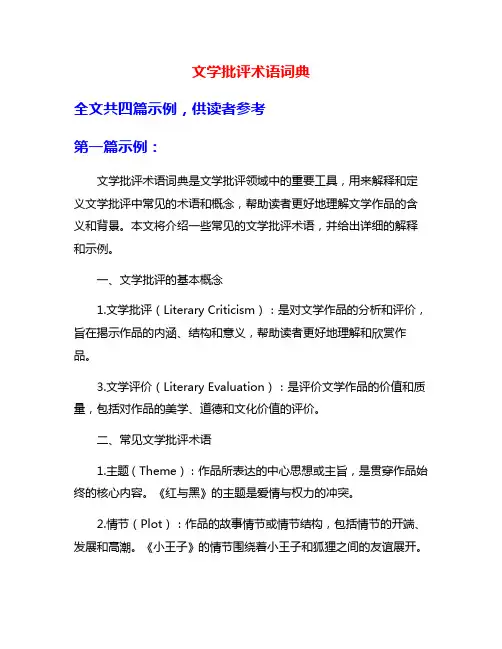
文学批评术语词典全文共四篇示例,供读者参考第一篇示例:文学批评术语词典是文学批评领域中的重要工具,用来解释和定义文学批评中常见的术语和概念,帮助读者更好地理解文学作品的含义和背景。
本文将介绍一些常见的文学批评术语,并给出详细的解释和示例。
一、文学批评的基本概念1.文学批评(Literary Criticism):是对文学作品的分析和评价,旨在揭示作品的内涵、结构和意义,帮助读者更好地理解和欣赏作品。
3.文学评价(Literary Evaluation):是评价文学作品的价值和质量,包括对作品的美学、道德和文化价值的评价。
二、常见文学批评术语1.主题(Theme):作品所表达的中心思想或主旨,是贯穿作品始终的核心内容。
《红与黑》的主题是爱情与权力的冲突。
2.情节(Plot):作品的故事情节或情节结构,包括情节的开端、发展和高潮。
《小王子》的情节围绕着小王子和狐狸之间的友谊展开。
3.人物(Character):作品中的角色或人物形象,包括主角、配角和背景人物。
《简·爱》中的简是一个勇敢、坚强而又独立的女性形象。
4.象征主义(Symbolism):作品中运用象征符号来表达和暗示深层含义和思想。
《老人与海》中的海洋象征着生命的无穷力量和挑战。
5.意象(Imagery):作品中通过形象、视觉感受和情感感受来塑造作品的意境和氛围。
《百年孤独》中的繁华热闹的马孔多镇是一个充满奇幻和奇迹的幻想之地。
6.叙事者(Narrator):讲述作品故事的角色或者视角,包括第一人称叙述和第三人称叙述。
《了不起的盖茨比》中的叙述者尼克是一个第一人称叙述者,观察并叙述了盖茨比的故事。
7.调性(Tone):作品的语言和态度,体现了作者的主观情感和态度。
《白鲸》的调性严肃庄重,充满宏大的氛围。
8.风格(Style):作者在作品中使用的语言、结构和表现手法,体现了作者的个人风格和创作特点。
《唐吉可德》的风格是幽默夸张,充满讽刺意味。
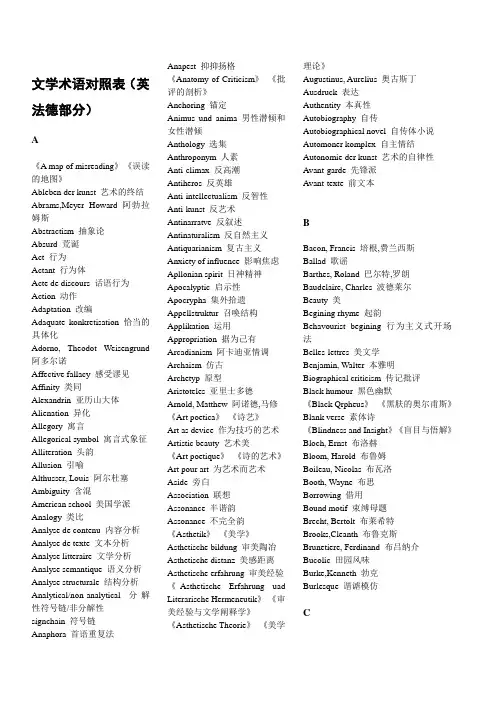
文学术语对照表(英法德部分)A《A map of misreading》《误读的地图》Ableben der kunst 艺术的终结Abrams,Meyer Howard 阿勃拉姆斯Abstractism 抽象论Absurd 荒诞Act 行为Actant 行为体Acte de discours 话语行为Action 动作Adaptation 改编Adaquate konkretisation 恰当的具体化Adorno, Theodot Weisengrund 阿多尔诺Affective fallacy 感受谬见Affinity 类同Alexandrin 亚历山大体Alienation 异化Allegory 寓言Allegorical symbol 寓言式象征Alliteration 头韵Allusion 引喻Althusser, Louis 阿尔杜塞Ambiguity 含混American school 美国学派Analogy 类比Analyse de contenu 内容分析Analyse de texte 文本分析Analyse litteraire 文学分析Analyse semantique 语义分析Analyse structurale 结构分析Analytical/non-analytical 分解性符号链/非分解性signchain 符号链Anaphora 首语重复法Anapest 抑抑扬格《Anatomy of Criticism》《批评的剖析》Anchoring 锚定Animus und anima 男性潜倾和女性潜倾Anthology 选集Anthroponym 人素Anti-climax 反高潮Antiheros 反英雄Anti-intellectualism 反智性Anti-kunst 反艺术Antinarratve 反叙述Antinaturalism 反自然主义Antiquarianism 复古主义Anxiety of influence 影响焦虑Apllonian spirit 日神精神Apocalyptic 启示性Apocrypha 集外拾遗Appellstruktur 召唤结构Applikation 运用Appropriation 据为己有Arcadianism 阿卡迪亚情调Archaism 仿古Archetyp 原型Aristoteles 亚里士多德Arnold, Matthew 阿诺德,马修《Art poetica》《诗艺》Art as device 作为技巧的艺术Artistic beauty 艺术美《Art poetique》《诗的艺术》Art pour art 为艺术而艺术Aside 旁白Association 联想Assonance 半谐韵Assonance 不完全韵《Asthetik》《美学》Asthetische bildung 审美陶冶Asthetische distanz 美感距离Asthetische erfahrung 审美经验《Asthetische Erfahrung uadLiterarische Hermeneutik》《审美经验与文学阐释学》《Asthetische Theorie》《美学理论》Augustinus, Aurelius 奥古斯丁Ausdruck 表达Authentity 本真性Autobiography 自传Autobiographical novel 自传体小说Automoner komplex 自主情结Autonomie der kunst 艺术的自律性Avant-garde 先锋派Avant-texte 前文本BBacon, Francis 培根,费兰西斯Ballad 歌谣Barthes, Roland 巴尔特,罗朗Baudelaire, Charles 波德莱尔Beauty 美Begining rhyme 起韵Behavourist begining 行为主义式开场法Belles-lettres 美文学Benjamin, Walter 本雅明Biographical criticism 传记批评Black humour 黑色幽默《Black Qrpheus》《黑肤的奥尔甫斯》Blank verse 素体诗《Blindness and Insight》《盲目与悟解》Bloch, Ernst 布洛赫Bloom, Harold 布鲁姆Boileau, Nicolas 布瓦洛Booth, Wayne 布思Borrowing 借用Bound motif 束缚母题Brecht, Bertolt 布莱希特Brooks,Cleanth 布鲁克斯Brunetiere, Ferdinand 布吕纳介Bucolic 田园风味Burke,Kenneth 勃克Burlesque 谐谑模仿CCaesure 停顿Cartesianism 笛卡尔主义Cassirer, Ernst 卡西尔Catalog 排列Catalyser 催化单元Catastrophe 结局Catharsis 宣泄Causal sequence 因果序Chain verse 连环诗Channel 渠道Chanson de geste 武功歌Chapelain, Jean 夏泼兰Chiasmus 交叉排比《Chinese character as medium for poetry》《作为诗歌手段的中国文字》Chinoiserie 中国风Chronical play 编年史剧Chrononym 时素Climax 高潮Cloak and dagger 阴谋小说Cloak and sword 剑侠传奇Closet drama 书案剧Co-textual context 共存文本语境Code 信码Coincidence 巧合Coleridge, Samuel Taylor 柯勒律治,萨缪尔·泰勒Collage 拼贴Collective foculization 集体视角式Comedy of manners 风俗喜剧Comic relief 喜剧穿插Commentary 评论Comparative literature 比较文学Comparative poetics 比较诗学Compound narrator 复合叙述者Computational stylistics 数理风格学Conative 意动性Conceit 曲喻Context 语境Contextualism 语境论Contrapuntal 对位式Contrast 对比Convention 常规Conventionality 规约性Cousin,Victor 库赞Crane, R.S. 克莱恩,R.S.Crenologie 渊源学Critical distance 批评距离《Criticism and Ideology》《批评与意识形态》Croce, Benedetto 克罗齐Crown of sonnets 皇冠十四行诗Cubic poetry 立体诗Cult value 崇拜价值DDactyl 扬抑抑格Dante, Alighieri 但丁Das asthetische objekt 审美对象Das asthetische erlebnis 审美体验Dasein 此在《Das Literarische Kunst-werk》《文学艺术作品》《Das Prinzip der Hoffnung》《希望的原则》Das selbst 自性De Man, Paul 德曼Dead space 空档Decentering of subjectivity 主体分化Decoding 解码Decorum 合体Deep-structure 深层结构Demystification 非神话化Denudation 剥离Der funkionale realismus 功能现实主义Der hermeneutische zirkel 阐释的循环Der implizite leser 隐在的读者《Der Implizite Leser》《隐在的读者》Derrida, Jacques 德里达Description 描写Desemantization 消义化Diachronic 历时性Diachronische analyse 历时性分析Diary fiction 日记体小说Dichotomy 对立式《Dichter und Phantasie》《诗人与幻想》“Dictionary” interpretation“词典”式释义Diderot, Denis 狄德罗《Die Beziehung Zwischen Dichter undTagtraum》《诗人与白昼梦的关系》《Die Eigenart des Asthetischen》《审美特性》Die frankfurter schule 法兰克福学派《Die Geburt der Tragodie》《悲剧的诞生》《Die welt als wille und vorstellung》《作为意志和表象的世界》Differentia of literature 文学特异性Dilthey, wilhelm 狄尔泰Dime novel 一角钱小说Dimeter 双音步诗行Dionysian spirit 酒神精神Direct free form 直接自由式Direct quoted form 直接引语式Directory 指点Disclosure 去蔽Discourse 讲述《Discours surl'art Paetique》《关于诗歌艺术的演讲》《Discours surle style》《论风格》Disengagement 脱身Dissociation of sensibility 感觉解体Distortion of duration 时长变形Doggerel 打油诗Doxologie 流传学Dramatism 戏剧化《Du Sublime》《论崇高》Dynamic motif 动力性母题EEagleton,Terry 伊格尔顿《Eckermann:Gesprach mit Goethe》《和爱克曼的谈话录》Ecole de geneve 日内瓦学派《Economic and philosophic Manuscripts of 1844》《1844年经济学哲学手稿》Ecriture automatique 自动写作Ego 自我Einfuhlung;Empathy 移情Elegy 挽诗Eliot,T.S. 艾略特Ellipsis 省略Emotive 情绪性Empson,William 燕卜荪Encoding 编码Encomium 赞诗“Encyclopedia”interpretation“百科式”释义Endogene bilder 内生图象End-rhyme 尾韵Engels, Fridrich 恩格斯Enjambement 跨行Erlebnis 体验Enonce 表述Enonciation 表述行为英Enonciation/utterance法表述/被表述Enonciation/enonce Entkunstung 非艺术化Envelope structure 封套结构Epigram 警句Epiphany 灵悟Epistolary fiction 书信体小说Epithalamium,epithalamion 婚后诗Epoch 时代Erwartungshorizont 期待视野Euphuism 游浮体Evaluative commentary 评价性评论Exhibition Value 展览价值Expectation 期待Expectation of meaning 意义期待Expectation of non-reference 非指称化期待Expectation of rhythm 节律化期待Expectation of totality 整体化期待Explanation/understanding 说明/理解Explanatory commentary 解释性评论Explication de texte 文本解释Explicit ellipsis 明省略Explicit narrator 现身叙述者Extra-textual elements 超文本成分Eye-rhyme 目韵Eye-rhyme 视韵FFable 寓言Fallacy of communication 传达谬见Fairy-tale 童话Fait social 社会事实Farce 笑剧Feminine rhyme 阴韵Feminist criticism 女权主义批评Fest 节日Fields of semiotics 符号学领域分科Fish, Stanley Eugene 费什Flashback 倒述Flashforward 预述Flat character 扁平人物“Fly-on-the-wall” technique“墙上苍蝇”式叙述法Focalization 叙述角度Focus character 视角人物Folklore 民间传说Folktale 民间故事Followability 可追踪性Foregrounding 前推Foreshadowing 伏笔Form 形式Formalism 形式主义Fortune 际遇Foucault,Michel 福柯,米歇尔Fourteener 七音步十四音节Frame story 框架故事Framework-story 连环故事France,Anatole 法朗士Free motif 自由母题Free verse 自由诗French school 法国学派French poststructuralist 法国后结构主义符号学派Freud,Sigmund 弗洛伊德Freytag pyramid 弗雷塔格金字塔Function 功能Function 功能体GGadamer,Hans Georg 迦达默尔General literature 总体文学Generation 代Genetic fallacy 发生谬见Genette,Gerard 惹奈特,杰Genre 文类Genology 文类学Gesellschaftlichkeit der Kunst 艺术的社会性Gesellschaftliche rezeption 社会接受Gesellschaftliche vermittelung 社会中介Gestalt 格式塔Gestaltgesetze 格式塔规律Gestaltqualitat 格式塔质Gide,Andre 纪德Gnomic verse 格言诗Goldmann,Lucien 戈德曼Gongorism 贡古拉文风Gothic novel 哥特小说Grotesque 怪诞Greimas,Algidas Julien 格雷马斯HHabermas,Jurgen 哈贝马斯Half-rhyme 半韵Half-rhyme 腰韵Heiddeger,Martin 海德格尔Heresy of paraphrase 意释误说Hermeneutik 阐释学Heroic couplet 英雄双韵诗Hexameter 六音步诗行High comedy 高雅喜剧Higher narrative level 高叙述层次Hirsch,Eric Donald Jr 赫什Histoire litteraire 文学史Historical narration 历史叙述/文学叙述Holland,Norman N. 霍兰德Horizont 视界Horizont verschmelzung 视界融合Hulme,T.E. 休姆Humanism 人文主义Humanistic criticism 人文主义批评Humor 幽默Hymn 赞美诗IIamb 抑扬格Iconicity 象似性Id 本我Identif ikationsmuster 认同类型Ideologie kritik 意识形态批评Image 意象Imagination 想象Imitation 模仿Impersonality 非个性化Implicit ellipsis 暗省略Implicit lower narrative level 隐式低叙述层次Implicit narrator 隐身叙述者Implied author 隐指作者Implied metaphor 潜喻Implied reader 隐指读者Impure poetry 不纯诗Impressionistic criticism 印象式批评Index 指示体Indexical context 标示语境Indexicality 标示性Indice 标记体Indirect free form 间接自由式Indirect quoted form 间接引语式Individuation 个性化Influence 影响Influence study 影响研究Informant 信息体Ingarden, Roman 英加登Institution litteraire 文学建制Intertextuality 互文性Intentional context 意图语境Intentional fallacy 意图谬见Intentionaler gegenstand 意向对象Intentionalitat 意向性Interdisciplinary study 跨学科研究Interior monologue 内心独白Internal rhyme 内韵Interpretation 阐释《Intuition creatrice en art et enpoesie》《艺术和诗的创造性直觉》Irony 反讽Ironic commentary 反讽性评论Ironic narrative 反讽叙述《Is there a text in this class?》《这门课有无文本?》Isomorphie 异质同构JJames,Henry 詹姆斯,亨利Jameson,Fredric 詹姆逊Johnson,Samuel 约翰逊,萨缪尔Journal intime 内心日记Jung,Carl Gustav 荣格Juxtaposition 意象并置Juxtaposition 并置KKeats,John 济慈,约翰Kermode,J.Frank 科默德Kollektives unbewaβtes集体无意识Komplex 情结Konkrete Poesie 具象诗Konkretisation 具体化Krieger,Murray 克里格Kristeva,Julia 克里斯特娃,朱《Kritik der Urteilskraft》《判断力批判》Kulturindustrie 文化工业LLa nouvelle critique 法国新批评La psychocritique 精神批评《La phylosophie de l'art》《艺术哲学》Lacan,Jacques 拉康Lament 哀诗Language as gesture 姿势语论Langue/parole 语言/言语Lanson,Gustave 朗松,G.Leavis,F.R 李维斯Lebenstrieb/eros 生本能/性本能Leitmotiv 主导母题Leser 读者Libido 力必多Lichtung 澄明Life expression 生命表达Link sonnet 连韵十四行诗Lisibilite 可阅读性Lipps,Theodor 李普斯Literalism 字面论Local colour 地方色彩Low comedy 低俗喜剧Lower narrative level 低叙述层次Lukacs,Georg 卢卡契Lyric 抒情诗MMacherey,Pierre 马舍雷,彼Macro-semiotic system 宏观符号系统Macro-sign 宏观符号Macro-text 宏观文本Main plot 主情节Manipulative narrative 操纵式叙述Mannerism 矫饰主义Manuscript 手写本Marcuse,Hebert 马尔库塞Marx, Karl 马克思Masculin rhyme 阳韵Medium 中介Medievalism 中世纪精神Melodrama 情节剧Memoires fiction 回忆录小说Mesologie 媒介学Message 信息Meta- 元Metacriticism 元批评《Metahistory》《元历史》Metalanguage 元语言Metalingual 元语言性Metaphysische qualitat 形而上质量Metaphor 隐喻Meter 音步Metonymy 转喻Miller,J. Hillis 米勒Mime 哑剧Miracle play 奇迹剧Mise en scene 导演Misreading 误读Mock-heroic 戏仿英雄体Monodrama 独角戏Montage 蒙太奇Montivation 促动因素Moral criticism 道德批评Motif 母题Motivation 根据性Movement 运动Mukarovsky,Jan 慕卡洛夫斯基Multiple plot 复合情节Musical comedy 音乐喜剧Myth 神话NNaive dichtang 素朴诗Narratee 叙述接收者Narrative 叙述Narratorial intrusion 叙述干预Narrative poem 叙事诗Narrative perspective 叙述方位Narrative setup 叙述格局Narrative stratification 叙述分层Narrativity 叙述性Narratology 叙述学Narrator 叙述者Narrativity 叙述性Narratorial mediation 叙述加工National literature 民族文学Naturalization 自然化Natural beauty 自然美Negative influence 负影响Negativitat der kunst 艺术的否定性Neologism 新词风格New criticism 新批评派Nietzsche, Friedrich Wilhelm 尼采Nokan,Charles 诺康Non-referential pseudostatement非指称性伪陈述Non-significant system 无意义组合Northrop Frye 诺思洛普·弗莱Novel 长篇小说Novella 中篇小说Nucleus 核心单元OObjective criticism 客观批评Octave rima 八行诗Ode 颂诗Odipuscomplex 俄底浦斯情结Omniscient narrative 全知式叙述《On Modern Novel》《现代小说》《On Dramatic Art》《论戏剧艺术》Onomatopoeia 拟声Ontological criticism 本体式批评Open-ended 开放结尾式Opera 歌剧Organism 有机论Ostranenie 陌生化Overcoding 附加解码Overstatement 夸大陈述PPalindrome 回文Panegyric 颂文Pantheism 泛神论Paradigm 纵聚合系Paradox 悖论Paralipses 假省笔法Parallel study 平行研究Paraphrasability 可意释性Paratextual elements 类文本成分Parole 言语Parody 戏仿Passion play 耶稣受难剧Pastiche 仿作Pastoral 牧歌Pater,Walter 佩特,沃尔特Pathetic fallacy 感情误置Pathos 哀婉感受Pause 停顿Periphrasis 迂回Period 时期Persona 人格面具Personliches unbewates 个人无意识Perspective of incongruity 不相容透视Phatic 交际性《Phenomenologie de l'experienceesthetique》《审美经验现象学》Phrase rhythm 词组节奏Picaresque novel 流浪汉小说Pirated edition 盗版Platon 柏拉图Platonism 柏拉图主义Plot 情节Plotinus 普洛丁Plot typology 情节类型学Poetic licence 诗歌特权Poetic drama 诗剧Poetic truth 诗歌真理《Poetics》《诗学》Poetique de lespace 空间诗学Poetry 诗Poetry of inclusion 包容诗Poetry of exclusion 排它诗Point of view 视点Poulet, Georges 布莱Polyphone harmonie 复调和谐Pope,Alexander 蒲柏,亚历山大Pornography 色情文学Possible worlds 可能世界Post-structuralism 后结构主义Pound, Ezra 庞德Pragmatics 符用学Prague school 布拉格学派Preciosite 高雅Pre-text 前文本Prinzip der aquivalerz 等值原则Prinzip der entropie 均衡原则Private symbol 私设象征Problem novel 问题小说Problem play 问题剧Production of art 艺术生产Projektion 投射propagandism 宣传Prosody 诗律Prothalamion 婚前诗Proverb 格言Proverb 谚语Provincialism 外省风格Proust, Marcel 普鲁斯特Psychische energie 心理能Psychische funktion 心理功能Psychische valenz 心理值Psychische zustand 心态Psychological context 心理语境Psychological fiction 心理小说Psychological realism 心理现实主义Psychologische und 心理型和幻想型illusionarer typPsychologische rezeptionsforschung 接受心理分析Psychologische typen 心理类型Psychologism 心理主义Public symbol 公共象征Pulp magazine fiction 廉价杂志小说Pun 双关语Pure poetry 纯诗QQualisign/sinsign/legisign 形符/单符/义符Qualitative knowledge 质的知识Qualitative progression 质性进展Querelle des anciens ermodernes古今之争RRationalism 理性主义Rational and perceptual 理性与感性Raymond Williams 维廉斯·雷蒙德Ransom, John Crowe 兰色姆Reader-response criticism 读者反应批评Realismo magico 魔幻现实主义Referential 指称性Reflection/nachdenken 反思Reification 物化Repetition 重复Repetition 复述Replica 复制Reported speech 转述语Reproduction 复制Resemantization 再义化Revenge tragedy 复仇悲剧Rezeptionsasthetik 接受美学Rezeptionsvorgabe 接受前提Rhapsody 狂诗Rhyme 韵Rhythm 节奏Richards.I.A. 瑞恰慈Riviere,Jacques 里维埃,J.Rohstoff 素材Romanaclef 影射小说Roman noir/Gothic novel 黑色小说/哥特小说Romantic irony 浪漫式反讽Round character 圆形人物Rousseau,Jean-Jacques 卢梭,让-雅Ruskin John 拉斯金·约翰SSage 英雄传奇Said,Edward W. 赛义德Saint Thomas Aquinas 托马斯·阿奎那Sainte-Beuve,Charles Augustin 圣伯夫Sapphics 萨福体Sartre,Jean-Paul 萨特Saussure,Ferdinand de 索绪尔,费德Scene 场景Schatten 阴影Schematisierte ansichten 轮廓化图象Schichtenaufbau 层次构造Schleiermacher, Friedrich Ernst Daniel施莱尔马赫Schoppenhauer,Arthur 叔本华Science fiction 科幻小说Scientific criticism 科学化批评Scriptible/lisibe 可写式/可读式Secondary system 二度体系Semanalysis 符号分析学Semantics 符义学Semantique poetique 诗歌语义学Semantique structurale 结构语义学Semiosis 符指过程Semiotics 符号学Sensibility 感性Sentimentalische dichtung 感伤诗Sentimentalism 感伤主义Sequence deformation 时序变形《Seven Types of Ambiguity》《含混的七种类型》Shelley,Percy Bysshe 雪莱Shock 震惊Short story 短篇小说Sign 符号Signifier/signified 能指/所指Simile 明喻Situational context 场合语境Skaldic verse 行吟宫廷诗Sociology of literature 文学社会学Soliloquy 独白Sonnet 十四行诗Sontag, Susan 桑塔格,苏珊Source 渊源Source study 渊源研究Southern critics 南方学派Soviet semiotics 苏联符号学派Spatial form 空间形式Spatial sequence 空间序Spiel 游戏Stadialism 阶段平行论Stael, Madame de 斯塔尔夫人Stanzaic form 诗节形式Stanzaic form 段式Starobinski, Jean 斯塔罗宾斯基Static motif 静力性母题Stereotype 模式Stoffgeschichte 主题学Stream of consciousness 意识流Stretch 延长Structural realism 结构现实主义Structuralism 结构主义Structuralist/post-structuralist semiotics 结构主义与后结构主义符号学《Structuralist Poeties》《结构主义诗学》Structure 结构Structure/texture 构架/肌质论Stylistics 风格学Stylization 风格模仿Sub-narrative 次叙述Sub-plot 次情结Sublimation 升华Sublime 崇高《Summa Theologiae》《神学大全》Summary 缩写Superego 超我Super-narrative 超叙述Superposition 意象迭加Super-sign 超符号Supplementary commentary 补充性批评Surface structure 表层结构Suspense 悬疑Symbol 象征Symbolic action 象征行动Symptomatic reading 症候式阅读Synaesthesia 通感Synaesthesis 综感Synchronic/diachronic 共时性/历时性Synchronische anayse 共时性分析Synecdoche 提喻Syntactics 符形学Syntagm 横组合段Syntagmatic/paradigmatic 横组合/纵聚合TTaboo 塔布Tagtraum 白日梦Taine, Hippolyte 泰纳Tate, Allen 退特Tecriture 文体Temporal deformation 时间变形Temporal sequence 时间序Tendenz 倾向性Tenioha 天尔运波Tenor/vihicle 喻指/喻体Tension 张力Tercet 三行体诗节Terza rima 三行连环韵诗Tetralogy 四部曲Tetrameter 四音步诗行Text/discourse 文本/讲述Textual criticism 文本批评Texture 肌质Theatre of cruelty 残酷剧The epic theatre 叙事剧The new criticism 新批评The new humanism 新人文主义《Theory of Literature》《文学理论》The past/the present 叙述现在/被叙述现在《The Political Unconsciousn》《政治无意识》《The Sacred Wood》《圣林》The Second self 第二自我《The Well-Wrought Urn》《精致的瓮》The Verbal Icon 《语象》The yale critics 耶鲁学派Thibaudet, Albert 蒂博代Three unities 三一律Todestrieb /thanatos-trieb 死本能Todorov, Tzvetan 托多罗夫Toponym 地素Totality 总体性Totem 图腾Tradition 传统Tragicomedy 悲喜剧Translation 翻译Transpassing of stratification 跨层Trilogy 三部曲Trilling, Lionel 特里林Trimeter 三音步诗行Type 类型Typicality 典型性Typical character 典型人物Typology 类型学UUgliness 丑Unbestimmtheit 不确定性《Uber die Beziehungen der AnalytischenPsychologie zur Dichtung》《分析心理学与诗的关系》Undercoding 不足解码Understatement 克制陈述Unite narrative 叙述单元Unite significative 意义单元Unites romanesques 小说单元Unreliable narrative 不可靠叙述Urtumliche bilder 原始意象Utilitarianism 功利主义Utopian literature 乌托邦文学V《Validity in interpretation》《解释的正确性》Valery, Paul 瓦雷里,P. Variorum edition 集注本Verbal icon 语象Verfremdung 陌生化Verfremdungseffekt 陌生化效果Verstehen 理解Verisimilitude 逼真性Vico, Giovanni Battista 维柯V orurteil 成见W《Wahreit und Methode》《真理与方法》Wellek, Rene 韦莱克Well-made play 巧构剧Werkimmanente kritik 文本批评Wilde, Osear 王尔德Wilson, Edmund 威尔逊,艾德蒙Wimsatt, William K.Jr 维姆萨特Wirkungsgeschichte 作用史Wittgenstein,Rudwig 维特根斯坦World/earth 世界/大地World literature 世界文学ZZero-sign 零符号Zola,Emile 左拉Zwei-pole-theorie 两极理论。
文学英语词汇大全了解经典文学作品的专业术语文学作品是人类智慧与情感的结晶,它们通过语言表达思想,启迪读者的想象力与情感。
作为文学爱好者,了解并掌握相关的文学英语词汇是必不可少的。
本文将介绍一些经典文学作品中常见的专业术语,帮助读者更好地理解文学作品。
一、小说常用词汇1. Protagonist(主角)- 故事的中心人物,通常是发展故事情节的主要推动力。
2. Antagonist(对手)- 与主角相对立的人物,通常是制造冲突和故事发展的阻碍者。
3. Plot(情节)- 故事的基本框架,包括起承转合等不同部分。
4. Setting(背景)- 故事发生的地点和时间背景。
5. Conflict(冲突)- 故事中出现的矛盾和问题,是推动情节发展的驱动力。
6. Theme(主题)- 故事的核心思想或主旨。
7. Foreshadowing(暗示)- 在故事中提前暗示后续发展的情节或事件。
8. Symbolism(象征主义)- 通过特定的符号或象征来传递更深层次的意义。
9. Irony(讽刺)- 用逆转的手法展示出与表面相反的结果或意义。
10. Point of view(视角)- 故事叙述的角度,可以是第一人称、第三人称等。
二、诗歌专业术语1. Rhyme(押韵)- 诗歌中相邻句子或词语的音韵相同或相似。
2. Meter(韵律)- 诗歌中由重音和轻音组成的节奏。
3. Stanza(诗节)- 诗歌中的一组排列整齐的行。
4. Simile(明喻)- 通过使用"like"或"as"来进行比喻的修辞手法。
5. Metaphor(隐喻)- 直接将一个事物比作另一个事物的修辞手法。
6. Personification(拟人)- 赋予非人事物以人类特征的修辞手法。
7. Alliteration(头韵)- 诗句中多个字母或音节以相同的辅音开头。
8. Assonance(押韵)- 诗句中多个字母或音节以相同的元音结尾。
文学理论术语小辞典(仅供内部参考使用)目录目录 (I)1 .文学四要素 (1)2 .摹仿说 (1)3 .观物取象说 (1)4 .表现说 ......................................................................................................... 15 .言志说 (1)6 .文学本体论 (1)7 .劳动说 (1)8 .不平衡说 (1)9 .循环说 (1)10 .文学三义 (1)11 .话语 (1)12 .审美无功利性 (2)13 .直觉 (2)14 .文学的审美意识形态性质 (2)15 .文学的双重性质 (2)16 .话语蕴藉 (2)17 .含蓄与含混 (2)18 .文学 (2)19 .文学创造材料 (2)20 .艺术发现 (2)21 .创作动机 (2)22 .艺术构思 (2)23 .回忆与沉思 (2)24 .想象与联想 (3)25 .灵感与直觉 (3)26 .理智与情感 (3)27 .意识与无意识 (3)28 .综合 (3)29 .突出和简化 (3)30 .变形与陌生化 (3)31 .即兴与推敲 (3)32 .现实型文学 (4)33 .理想型文学 (4)34 .象征型文学 (4)35 .浪漫主义文学 (4)36 .现实主义文学 (4)37 .象征主义文学 (4)38 .现代主义文学 (4)39 .诗 (4)40 .小说 (4)41 .剧本 (4)42 .散文 ........................................................................................................... 543 .报告文学 (5)44 .文学本文三层次 (5)45 .文学话语的特征 (5)46 .文学形象及其特征 (5)47 .文学意蕴及其层次 (5)48 .文学典型 (5)49 .文学意境 (5)50 .情景交融 (5)51 .虚实相生 (5)52 .韵味无穷 (6)53 .审美意象 (6)54 .叙事 (6)55 .叙事的构成 (6)56 .本文时间和故事时间 (6)57 .时序 (6)58 .时长 (6)59 .频率 (6)60 .叙述视角 (6)61 .叙述动作 (6)62 .叙述者 (6)63 .拟想接受者 (6)64 .抒情及其特征 (7)65 .宣泄 (7)66 .抒情内容与抒情话语 (7)67 .声与情 (7)68 .景与情 (7)69 .抒情方式 (7)70 .抒情角色 (8)71 .风格 (8)72 .创作个性 (8)73 .话语情境 (8)74 .文学风格的特性 (8)75 .文学风格的形态 (8)76 .文学消费的二重性 (8)77 .期待视野 (8)78 .接受动机 (8)79 .接受心境 (8)80 .隐含的读者 ............................................................................................... 881 .填空、对话与兴味 .. (8)82 .还原与异变 (9)83 .理解与误解 (9)84 .期待遇挫 (9)85 .共鸣 (9)86 .净化 (9)87 .领悟 (9)88 .延留 (9)1 .文学四要素。
牛津文学术语词典
《牛津文学术语词典》是一本权威的文学术语词典,收录了大量的文学术语和相关概念的解释。
该词典涵盖了英美文学、欧洲文学、非洲文学、亚洲文学等各个文学体系,并包括了文学理论、文学批评、文学史等多个方面的内容。
该词典共分为两部分。
第一部分为A到M的词条,第二部分为N 到Z的词条。
每个词条都包含了该术语的定义、来源、历史、发展等方面的详细解释,同时还附有相关的例子和参考文献,方便读者深入了解该术语的使用和背景。
《牛津文学术语词典》对于学习文学理论和批评、历史、研究等方面的读者都具有重要的参考价值。
它不仅可用作学术研究的工具书,也适合广大文学爱好者使用,帮助他们更好地理解和欣赏文学作品。
- 1 -。
文学批评术语词典全文共四篇示例,供读者参考第一篇示例:文学批评术语词典是学习文学批评和文学理论的重要工具。
它收录了许多文学批评术语的解释和相关概念,帮助读者更深入地理解文学作品和文学批评理论。
本文将通过详细介绍几个常见的文学批评术语,以展示文学批评术语词典的重要性。
1. 叙述叙述是文学作品中的一种重要元素,指的是作者通过文字描述事件和故事情节的过程。
叙述可以分为直接叙述和间接叙述两种形式。
直接叙述是作者直接告诉读者发生了什么事情,而间接叙述则是通过对话、心理描写等方式暗示事件发展的情节。
叙述方式的选择对整个文学作品的节奏和氛围起着至关重要的作用。
2. 主题主题是文学作品中的核心思想或中心议题,是作者想要传达给读者的主要观点。
主题通常蕴含在作品的情节、人物形象和意象等元素中,在文学批评中起着至关重要的作用。
通过分析作品中的主题,读者可以更深入地了解作者的观点和思想,从而更好地理解和欣赏文学作品。
3. 符号符号是文学作品中常用的一种修辞手法,指的是用具体的事物或形象代表抽象的概念。
符号可以是物品、动物、人物或场景等,通过作者的巧妙运用,使得作品更加富有象征意义和深刻含义。
通过分析作品中的符号,读者可以更深入地理解作品所传达的思想和情感。
4. 风格风格是文学作品中的一种表现形式,指的是作者在表达思想和情感时所采用的语言和结构特点。
每位作家都有自己独特的写作风格,通过对作品的风格进行分析,读者可以更好地理解作者的个人风格和写作技巧。
文学批评中经常会对作家的风格进行深入探讨,以揭示作品的独特魅力和意义。
5. 象征主义象征主义是一种文学流派,源自于19世纪晚期的欧洲,以象征和隐喻为其特色。
象征主义作品常常含深沉、超现实、神秘和象征意义丰富。
象征主义文学强调情感、感觉和直觉,对现实进行深入的思考和探讨。
通过对象征主义作品的分析和解读,读者可以更深入地了解象征主义文学的特点和意义。
第二篇示例:文学批评术语词典是指在文学批评领域中常用的术语及其解释的集合,帮助人们更好地理解和分析文学作品。
文学术语汇编11.Literature of the absurd: (荒诞派文学) The term is applied to a number of works in drama and prose fiction which have in common the sense that the human condition is essentially absurd, and that this condition can be adequately represented only in works of literature that are themselves absurd. The current movement emerged in France after the Second World War, as a rebellion against essential beliefs and values of traditional culture and traditional literature. They hold the belief that a human being is an isolated existent who is cast into an alien universe and the human life in its fruitless search for purpose and meaning is both anguish and absurd.2.Theater of the absurd: (荒诞派戏剧) belongs to literature of the absurd. Two representatives of this school are Eugene Ionesco, French author of The Bald Soprano (1949) (<秃头歌女>), and Samuel Beckett, Irish author of Waiting for Godot (1954) (<等待戈多>). They project the irrationalism, helplessness and absurdity of life in dramatic forms that reject realistic settings, logical reasoning, or a coherently evolving plot.3.Black comedy or black humor: (黑色幽默) it mostly employed to describe baleful, naïve, or inept characters in a fantastic or nightmarish modern world playing out their roles in what Ionesco called a “tragic farce”, in which the events are often simultaneously comic, horrifying, and absurd. Joseph Heller’s Catch-22 (美国著名作家约瑟夫海勒<二十二条军规>) can be taken as an example of the employment of this technique.文学术语汇编24. art for art’s sake: or the Aesthetic Movement(唯美主义): it began to prevail in Europe at the middle of the 19th century. The theory of “art for art’s sake” was first put forward by some French artists. They declared that art should serve no religious, moral or social purpose. The two most important representatives of aestheticists in English literature are Walt Pater and Oscar Wilde.5. Allegory(寓言): a tale in verse or prose in which characters, actions, or settings represent abstract ideas or moral qualities, such as John Bunyan’s The Pilgrim’s Prog ress. An allegory is a story with two meanings, a literal meaning and a symbolic meaning.6. Fable(寓言): is a short narrative, in prose or verse, that exemplifies an abstract moral thesis or principle of human behavior. Most common is the beast fable, in which animals talk and act like the human types they represent. The fables in Western cultures derive mainly from the stories attributed to Aesop, a Greek slave of the sixth century B. C.7. Parable(寓言): is a very short narrative about human beings presented so as to stress analogy with a general lesson that the narrator is trying to bring home to his audience. For example, the Bible contains lots of parables employed by Jesus Christ to make his flock understand his preach.8. Alliteration(头韵): the repetition of the initial consonant sounds. In Old English alliterative meter, alliteration is the principal organizing device of the verse line, such as in Beowulf.9. Consonance is the repetition of a sequence of two or more consonants but with a change in the intervening vowel, such as “live and love”.10. Assonance is the repetition of identical or similar vowel, especially in stressed syllables, in a sequence of nearby words, such as “child of silence”.11. Allusion (典故)is a reference without explicit identification, to a literary or historical person, place, or event, or to another literary work or passage. Most literary allusions are intended to be recognized by the generally educated readers of the author’s time, b ut some are aimed at a specialgroup.12. Ambiguity(复义性): Since William Empson(燕卜荪)published Seven Types of Ambiguity (《复义七型》), the term has been widely used in criticism to identify a deliberate poetic device: the use of a single word or expression to signify two or more distinct references, or to express two or more diverse attitudes or feeling.文学术语汇编313. Antihero(反英雄):the chief character in a modern novel or play whose character is totally different from the traditional heroes. Instead of manifesting largeness, dignity, power, or heroism, the antihero is petty, passive, ineffectual or dishonest. For example, the heroine of Defoe’s Moll Flanders is a thief and a prostitute.14. Antithesis(对照):(a figure of speech)An antithesis is often expressed in a balanced sentence, that is, a sentence in which identical or similar syntactic structure is used to express contrasting ideas. For example, “Marriage has many pains, but celibacy(独身生活)has no pleasures.” by Samuel Johnson obviously employs antithesis.15. Archaism(拟古):the literary use of words and expressions that have become obsolete in the common speech of an era. For example, the translators of the King James Version of Bible gave weight and dignity to their prose by employing archaism.16. Atmosphere(氛围): the prevailing mood or feeling of a literary work. Atmosphere is often developed, at least in part, through descriptions of setting. Such descriptions help to create an emotional climate to establish the reader’s expectations and attitudes.文学术语汇编417. Ballad(民谣):it is a song, transmitted orally, which tells a story. It originated and was communicated orally among illiterate or only partly literate people. It exists in many variant forms. The most common stanza form, called ballad stanza is a quatrain in alternate four- and three-stress lines; usually only the second and fourth lines rhyme. Although many traditional ballads probably originated in the late Middle Age, they were not collected and printed until the eighteenth century.18. Climax:as a rhetorical device it means an ascending sequence of importance. As a literary term, it can also refer to the point of greatest intensity, interest, or suspense in a story’s turning point. The action leading to the climax and the simultaneous increase of tension in the plot are known as the rising action. All action after the climax is referred to as the falling action, or resolution. The term crisis is sometimes used interchangeably with climax.19. Anticlimax(突降):it denotes a writer’s deliberate drop from the serious and elevated to the trivial and lowly, in order to achieve a comic or satiric effect. It is a rhetorical device in English. 20. Beat Generation(垮掉一代):it refers to a loose-knit group of poets and novelists, writing in the second half of the 1950s and early 1960s, who shared a set of social attitudes – antiestablishment, antipolitical, anti-intellectual, opposed to the prevailing cultural, literary, and moral values, and in favor of unfettered self-realization and self-expression. Representatives of the group include Allen Ginsberg, Jack Kerouac and William Burroughs. And most famous literary creations produced by this group should be Allen Ginsberg’s long poem Howl and Jack Kerouac’s On the Road.文学术语汇编521. Biography(传记):a detailed account of a person’s life written by another person, such a s Samuel Johnson’s Lives of the English Poets and James Boswell’s Life of Samuel Johnson.22. Autobiography(自传):a person’s account of his or her own life, such as Benjamin Franklin’s autobiography.23. Blank verse(无韵体): Verse written in unrhymed iambic pentameter. It is the verse form used in some of the greatest English poetry, including that of William Shakespeare and John Milton. 24. A parody(模仿)imitates the serious manner and characteristic features of a particular literary work, or the distinctive style of a particular author, or the typical stylistic and other features of a serious literary genre, and deflates the original by applying the imitation to a lowly or comically inappropriate subject.文学术语汇编625. Celtic Revival also known as the Irish Literary Renaissance (爱尔兰文艺复兴)identifies the remarkably creative period in Irish literature from about 1880 to the death of William Butler Yeats in 1939. The aim of Yeats and other early leaders of the movement was to create a distinctively national literature by going back to Irish history, legend, and folklore, as well as to native literary models. The major writers of this movement include William Butler Yeats, Lady Gregory, John Millington Synge and Sean O’Casey and so on.26. Characters(人物)are the persons represented in a dramatic or narrative work, who are interpreted by the reader as being endowed with particular moral, intellectual, and emotional qualities by inferences from the dialogues, actions and motivations. E. M. Forster divides characters into two types: flat character, which is presented without much individualizing detail; and round character, which is complex in temperament and motivation and is represented with subtle particularity.27. Chivalric Romance (or medieval romance) (骑士传奇或中世纪传奇)is a type of narrative that developed in twelfth-century France, spread to the literatures of other countries. Its standard plot is that of a quest undertaken by a single knight in order to gain a lady’s favor; frequently its central interest is courtly love, together with tournaments fought and dragons and monsters slain. It stresses the chivalric ideals of courage, loyalty, honor, mercifulness to an opponent, and elaborate manners.28. Comedy:(喜剧)in general, a literary work that ends happily with a healthy, amicable armistice between the protagonist and society.29. Farce (闹剧)is a type of comedy designed to provoke the audience to simple and hearty laughter. To do so it commonly employs highly exaggerated types of characters and puts them into improbable and ludicrous situations.30. Confessional poetry(自白派诗歌)designates a type of narrative and lyric verse, given impetus by Robert Lowell’s Life Studies, which deals with the facts and intimate mental and physical experiences of the poet’s own li fe. Confessional poetry was written in rebellion against the demand for impersonality by T. S. Elliot and the New Criticism. The representative writers of confessional school include Robert Lowell, Anne Sexton and Sylvia Plath and so on.31. Critical Realism:(批判现实主义)The critical realism of the 19th century flourished in the fouties and in the beginning of fifties. The realists first and foremost set themselves the task of criticizing capitalist society from a democratic viewpoint and delineated the crying contradictions of bourgeois reality. But they did not find a way to eradicate social evils. Representative writers of this trend include Charles Dickens and William Makepeace Thackeray and so on.32. Drama:(戏剧)The form of composition designed for performance in the theater, in whichactors take the roles of the characters, perform the indicated action, and utter the written dialogue. (The common alternative name for a dramatic composition is a play.)文学术语汇编733. Dramatic Monologue:(戏剧独白)a monologue is a lengthy speech by a single person. Dramatic monologue does not designate a component in a play, but a type of lyric poem that was perfected by Robert Browning. By using dramatic monologue, a single person, who is patently not the poet, utters the speech that makes up the whole of the poem, in a specific situation at a critical moment. For example, Robert Browning’s famous poem “My Last Duchess” was written in dramatic monologue.34. Elegy(哀歌或挽歌):a poem of mourning, usually over the death of an individual. An elegy isa type of lyric poem, usually formal in language and structure, and solemn or even melancholy in tone.35. Enlightenment(启蒙运动):The name applied to an intellectual movement which developed in Western Europe during the seventeenth century and reached its height in the eighteenth. The common element was a trust in human reason as adequate to solve the crucial problems and to establish the essential norms in life, together with the belief that the application of reason was rapidly dissipating the remaining feudal traditions. It influenced lots of famous English writers especially those neoclassic writers, such as Alexander Pope.36. Epic(史诗):it is a long verse narrative on a serious subject, told in a formal and elevated style, and centered on a heroic or quasi-divine figure on whose actions depends the fate of a tribe, a nation, or the human race.37. Epiphany:(顿悟)In the early draft of A Portrait of the Artist as a Young Man, James Joyce employed this term to signify a sudden sense of radiance and revelation that one may feel while perceiving a commonplace object. “Epiphany” now has become the standard term for the description, frequent in modern poetry and prose fiction, of the sudden flare into revelation of an ordinary object or scene.38. Epithet(移就): as a term in criticism, epithet denotes an adjective or adjectival phrase used to define a distinctive quality of a person or thing. This method was widely employed in ancient epics. For example, in Homer’s epic, the epithet like “the wine-dark sea” can be found everywhere.39. Essay:(散文)any short composition in prose that undertakes to discuss a matter, express a point of view, persuade us to accept a thesis on any subject, or simply entertain. The essay can be divided as the formal essay and the informal essay (familiar essay).40. Euphemism(委婉语): An inoffensive expression used in place of a blunt one that is felt to be disagreeable or embarrassing, such as “pass away” instead of “die”41. Expressionism(表现主义):a German movement in literature and the other arts which was at its height between 1910 and 1925 – that is, in the period just before, during, and after WWⅠ. The expressionist artist or writer undertakes to express a personal vision – usually a troubled or tensely emotional vision – of human life and human society. This is done by exaggerating and distorting. We recognize its effects, direct or indirect, on the writing and staging of such plays as Arthur Miller’s Death of a Salesman as well as on the theater of the absurd.42. Free verse(自由体诗):Like traditional verse, it is printed in short lines instead of with the continuity of prose, but it differs from such verse by the fact that its rhythmic pattern is notorganized into a regular metrical form – that is, into feet, or recurrent units of weak and strong stressed syllables. Most free verse also has irregular line lengths, and either lacks rhyme or else uses it only occasionally. Walt Whitman is a representative who employed this poem form successfully.文学术语汇编843. Gothic novel:(哥特式小说)It is a type of prose fiction. The writers of this type of fictions mostly set their stories in the medieval period and in a Catholic country, especially Italy or Spain. The locale was often a gloomy castle. The typical story focused on the sufferings imposed on an innocent heroine by a cruel villain. This type of fictions made bountiful use of ghosts, mysterious disappearances, and other supernatural occurrences. The principle aim of such novels was to evoke chilling terror and the best of this type opened up to the fiction the realm of the irrational and of the perverse impulses and nightmarish terrors that lie beneath the orderly surface of the civilized mind. Some famous novelists liked to employ some Gothic elements in their novels, such as Emily Bronte’s Wuthering Heights.44. Graveyard poets(墓园派诗歌): A term applied to eighteenth-century poets who wrote meditative poems, usually set in a graveyard, on the theme of human mortality, in moods which range from pensiveness to profound gloom. The vogue resulted in one of the most widely known English poems, Thomas Gray’s “Elegy Written in a Country Churchyard”.45. Harlem Renaissance(哈莱姆文艺复兴):a period of remarkable creativity in literature, music, dance, painting, and sculpture by African-Americans, from the end of the First World War in 1917 through the 1920s. As a result of the mass migrations to the urban North in order to escape the legal segregation of the American South, and also in order to take advantage of the jobs opened to African Americans at the beginning of the War, the population of the region of Manhattan known as Harlem became almost exclusively Black, and the vital center of African American culture in America. Distinguished writers who were part of the movement included Langston Hughes and Jean Toomer. The Great Depression of 1929 and the early 1930s brought the period of buoyant Harlem culture –which had been fostered by prosperity in the publishing industry and the art world – effectively to an end.46. Heroic Couplet(英雄双韵体)refers to lines of iambic pentameter which rhyme in pairs: aa, bb, cc, and so on. The adjective “heroic” was applied in the later seventeenth century because of the frequent use of such couplets in heroic poems and dramas. This verse form was introduced into English poetry by Geoffrey Chaucer. From the age of John Dryden through that of Samuel Johnson, the heroic couplet was the predominant English measure for all the poetic kinds; some poets, including Alexander Pope, used it almost to the exclusion of other meters.47. Hyperbole(夸张):this figure of speech called hyperbole is bold overstatement, or the extravagant exaggeration of fact or of possibility. It may be used either for serious or ironic or comic effect.48. Understatement(轻描淡写):this figure of speech deliberately represents something as very much less in magnitude or importance than it really is, or is ordinarily considered to be. The effect is usually ironic.49. Imagism(意象派):it was a poetic vogue that flourished in England, and even more vigorously in America, between the years 1912 and 1917. It was planned and exemplified by a group of English and American writers in London, partly under the influence of the poetic theory of T. E.Hulme, as a revolt against the sentimental and mannerish poetry at the turn of the century. The typical Imagist poetry is written in free verse and undertakes to be as precisely and tersely as possible. Meanwhile, the Imagist poetry likes to express the writers’ momentary impression of a visual object or scene and often the impression is rendered by means of metaphor without indicating a relation. Most famous Imagist poem, “In a Station of the Metro”, was written by Ezra Pound. Imagism was too restrictive to endure long as a concerted movement, but it influenced almost all modern poets of Britain and America.50. Irony(反讽):This term derives from a character in a Greek comedy. In most of the modern critical uses of the term “irony”, there remains the root sense of dissembling or hiding what is actually the case; not, however, in order to deceive, but to achieve rhetorical or artistic effects. 51. Local Colorism(地方色彩)was a literary trend belonging to Realism. It refers to the detailed representation in prose fiction of the setting, dialect, customs, dress and ways of thinking and feeling which are distinctive of a particular region. After the Civil War a number of American writers exploited the literary possibilities of local color in various parts of America. The most famous representative of local colorism should be Mark Twain who took his hometown near the Mississippi as the typical setting of nearly all his novels.52.Lyric(抒情诗):in the most common use of the term, a lyric is any fairly short poems consisting of the utterance by a single speaker, who expresses a state of mind or a process of perception, thought and feeling.53 回答问题Romanticism: In the most abstract terms, Romanticism may be regarded as the triumph of the values of imaginative spontaneity, visionary originality, wonder, and emotional self-expression over the classical standards of balance, order, restraint, proportion, and objectivity. Its name derives from romance, the literary form in which desires and dreams prevail over everyday realities.54 Byronic hero, characteristic of or resembling *Byron or his poetry; that is, contemptuous of and rebelling against conventional morality, or defying fate, or possessing the characteristics of Byron's romantic heroes, or imitating his dress and appearance; as *Meredith describes it, 'posturing statuesque pathetic'; or in the words of *Macaulay, 'a man proud, moody, cynical, with defiance on his brow, and misery in his heart, a scorner of his kind, implacable in revenge, yet capable of deep and strong affection'.55 回答问题Realism stressed 'sincerity' as opposed to the 'liberty' proclaimed by the Romantics; it insisted on accurate documentation, sociological insight, an accumulation of the details of material fact, an avoidance of poetic diction, idealization, exaggeration, melodrama, etc.; and subjects were to be taken from everyday life, preferably from lower-class life. This emphasis clearly reflected the interests of an increasingly positivist and scientific age.。
诗歌语言的常用术语和常用词典(一).评价诗歌语言的常用术语:质朴淡雅自然苍凉低沉苍劲生动形象沉郁顿挫淡笔勾勒舒缓悲凉雄健雄浑准确浓墨重彩艳丽多彩含蓄蕴藉富有哲理清新明快,平淡有趣简洁巧妙,入木三分语言凝练,生动传神属对工切,声韵和谐低回婉转,沉郁深微娓娓而谈,庄谐杂出自然宏丽,饶有风骨音节和谐流畅,语极工整朴实无华,淡雅含蓄炼字精巧,悠扬轻快,行云流水含蓄隽永,精巧蕴藉清而不淡,秀而不媚,柔和隽永,色调和谐通俗生动,平易炙热惟妙惟肖、字字是泪,声声哀叹,感人至深(四)、诗歌鉴赏常用典1.投笔:弃文从武2.鸡黍:专指招待客人的饭菜3.长城:守边的将士红豆象征爱情或相思4.楼兰:边境之敌5瑟瑟:原为绿色宝石的名称,后来借指绿色6.折腰:屈身事人杜康酒7.化碧:刚直忠正的人为正义事业而蒙冤受屈8.黍离:对国家昔盛今衰的痛惜伤感之情9.鸿雁,雁书,雁足,鱼雁书信,音讯11.桑榆:指日落时余光所照之处,后指垂老之年12.尺素:书信13.商女:即歌女,后以此为不顾国家存亡而醉生梦死的典故14.青鸾,青鸟传递书信的人15.鹧鸪:衬托处境的艰难或心情的惆怅16.双鲤,鲤鱼,鲤素书信17.杜鹃:渲染哀怨悲凄的气氛或思归的心情18.五柳:隐者19.鸿鹄:人有远大志向20.东篱,采菊:辞官归隐后的田园生活或闲雅的情致21.雕虫:微不足道的技能,多指文字技巧。
22.三径:隐士居住的地方。
23.风骚:优秀的文学作品或文采24.劳歌,渭城,阳关:送别时唱的歌曲25.长亭,南浦,柳岸:送别地26.夕阳:离别时的心情或暮年27.牧童淡泊,田园生活28.烟波:离别后漂泊无依29.吴钩:武器或有勇武豪情30.明月乡愁青云:高的地位31.孤雁,落帆,断鸿:孤独游子32.青紫:高官显爵33.丁香:愁心或情结。
34.青梅竹马:男女小时天真无邪一起玩耍35.蝉鸣:悲秋36.青天:清官37.落花:伤春38.落叶:秋天39.黄昏日暮:死亡迫近的忧惧或苍茫的历史意味40.西楼,望江楼:送别地或悠悠愁绪41.梅雨:悠悠愁绪。
① A term applied to a number of works in drama and prose fiction which have in common the sense that Human condition is essentially absurd which can be represented in works of literature that are themselves absurd.②After the 1940s,there was a widespread tendency,especially prominent in the existential philosophy of letters such as Sartre and Albert Camus to view a human being as isolated existent who is cast into alien universe which conceive no inherent truth,value or meaning to represent human life --in its fruitless search for purpose and meaning.③Samuel Beckett in his Waiting for Godot project the irrational ,helpless,absurdity of life in dramatic form that reject realistic setting,logic reasoning or a coherent evolving plot.1)In his Epic Theater,the German dramatist Brecht adapted theRussian Formalist concept of defamiliarization into what he called alienation effect.2)This effect Brecht said is to make the familiar aspect of present socialreality seem strange so to prevent the emotional identification and involvement of the audience with the character and their actions into a play.aim was to evoke a critical distance and attitude in thespectators,in order to arose them to take action against, rather than simply to accept the state of society and behavior represented on the stage.①The term Canon was used in literary application to signify the list of secular works accepted by experts as genuinely written by a particular author.②The factors in the process of canon formation are complex and disputed. However, it seems clear,that the process involve , among other conditions ,concurrence of critics,scholars and authors with diverse viewpoints and sensibilities,the persistent influence,the frequent reference to an author or work within the discourse of a cultural community,and the widespread assignment of an author or text in school and college curricula. Such factors are mutually interacted and need to be sustained over a period of time.③At any time, the boundaries of literary canon remain indefinite,while inside those boundaries some authors are central and others more marginal since the 1970s ,the nature of canon formation and opposition to establishing literary canons, have become a leading concern among critics of diverse viewpoints whether deconstructive, feminist ,postcolonial or new historicist.④ A wild spread change is that the standard canon of great bookshas been determined less by artistic excellence,but by its politics of power ,that is the canon has been formed in accordance with the ideology ,political interest and value of elite class that was white,male and European. The demand is “to open the canon”so as to make it multicultural and make it represent the achievement of a large of writers.1) A term developed in psychoanalysis to describe a continualfluctuation between wanting one thing and wanting its opposite.Adapted into colonial discourse theory by Homi Bhabha,it describes the complex mix of attraction and repulsion that characterizes the relationship between colonizer and colonized.2)Ambivalence disrupts the clear-cut authority of colonialdomination.As the colonial discourse wants to produce compliant subjects who reproduce its assumption ,habits and values. But ambivalent subject whose mimicry is never far from mockery produced a profound disturbance of the authority of colonial discourse in the fluctuating existence .3)Both Bhabha and Robert.Young think it is not a simply reversal ofbinary,for both colonizing and colonized subjects are implicated in the ambivalence of colonial discourse. The concept is related to hybridity, because just as ambivalence decenters authority form its position of power,so that authority may also become hybridized whenplaced in a colonial context in which it finds itself dealing with and often inflected by other culture.①In hoticulture, the term refers to the cross-breeding of two species. It also takes many forms in language as “pidgin”,in cultural ,political area.etc. In “The Dialogic Imagination” Bahkin uses it to suggest the disruptive and transfiguring power of multivocal language.②It is a wildly used but disputed term in post-colonial theory. It refers to the creation of new transcultural forms within the contact zone produced by colonization. The term has been most recently associated with the work of Homi. Bhabha. Bhabha contends that all cultural statements and systems are constructed in a space that he calls “The Third Space”.Cultural identity also emerge in this contradictory and ambivalent space which makes the claim to hierarchical purity of cultures untenable.It is the in-between space that carries the burden and meaning of culture,and this is what makes the notion of hybridity so important.③This term has also been criticized as it usually implies negating and neglecting the imbalence and inequality of the power relations it references.Robert Young warns us to avoid the unconscious process of hybridity, when talking about hybridity ,the contemporary cultural discourse can not escape the connection with the racial categories of the past in which hybridity had such a clear racial meaning.④Theories of hybrid nature of post-colonial culture assert a different mode of resistance,locating this in the subversive counter-discursive practices implicit in colonial ambivalence and so undermining the vary basis on which imperialist and colonialist discourse raises its claims of superiority.1)An increasingly important term in post-colonial theory,because it hascome to describe the ambivalent relationship between colonizer an colonized. When colonial discourse encourages the colonized subject to “mimic”the colonizer,by adopting its cultural habits,assumptions,intuitions and values,the result is never a simple reproduction of those traits. Rather,the result is a “blurred copy”of the colonizer that can be quite threatening.2)Mimicry reveals the limitation in the authority of colonialdiscourse ,almost as though colonial authority inevitably embodies the seeds of its own destruction.Mimicry therefore locates a crack in the certainty of colonial dominance,an uncertainty in its control of the behavior of the colonizedAgency①Agency refers to the ability to act or perform an action. In contemporary theory,it hinges on the question of whether individual can freely and autonomously initiate action, or the things they do are in somesense determined by the ways in which their identity has been constructed.②It is particularly important in post-colonial theory because it refers to the ability of post-colonial subjects to initiate action in engaging or resisting imperial power.Since human subjectivity is constructed by ideology,language and discourse ,any action performed by that subject must also be to some extent a consequence of those things.It may be difficult for subject to escape the effects of those forces that construct them.1)It refers to the rejection by post-colonial writers of a normativeconcept of “correct’ or “standard” English used by certain classes or groups,and of the corresponding concepts of inferior “dialect”“marginal variants’2)This concept,like appropriation which describes the processes ofEnglish adaptation itself,is an important component of post-colonial assumption that all language use is a ‘variant”of one kind of another.3)Abrogation offers a counter to the view that “you can’t dismantle themaster’s house with the master’s tools”.In fact, rather the master’s house is always adaptable and that the same tools offer a means of conceptual transformation and liberation.① A term used to describe the ways in which post-colonial societies take over those aspects of the imperial culture--language, forms of writing ,film, theater, even modes of thought and argument such as rationalism, logic and analysis --that may be of use to them in articulating their own social and cultural identities.②Appropriation may describe acts of usurpation in various cultural domains, but the most potent are the domains of language and textuality. Achebe noted that the language so use “can bear the burden of another experience”.By appropriating the imperial language,its discursive forms and its modes of representation,post-colonial societies are able to③cultural realities, or use that dominant language to describe those realities to a wide audience of readers.①Form “binary” means the combination of two things, a pair ,two duality.The concern with binarism was first established by French structural linguist, Saussure,who held that signs have meaning not by a simply reference to real objects,but by their opposition to other sign.Each sign in itself the function of signifer and sifnified, so the binary opposition is the most extreme form of difference. Sun and moon ,man and woman, birth and death such opposition is very common in the cultural construction of reality.②Feminist and postcolonial studies demonstrated such binariesentail a violent hierarchy in which one term of the opposition is always dominant and the binary opposition itself exists to confirm that dominance.Much of the contemporary postcolonial theory has been directed at breaking down various kinds of separation in the analysis of imperialism and colonialism ,while the danger for anti-colonial resistance comes when the binary opposition is simply reversed, which should be cautioned.1) A term coined by Edward Said to describe a way of reading the textsof English literature so as to reveal their deep implication in imperialism and colonial process. Borrowed from music ,the term suggests a responsive reading that provides a conterpoint to the text thus enabling the emergence of colonial implications that might otherwise remain hidden.2)By stressing the affiliations of the text, its origin in social and culturalreality rather than its filiative connections with English literature and canonical criteria, the critic can uncover cultural and political implications that may seem only fleetingly addressed in the text itself.①This pair of terms was brought to prominence by Edward Said to suggest filiation as the lines of descent in nature, affiliation as a process of identification through culture.Said promotes affiliation as ageneral critical principle because it sends the critical gaze beyond the narrow confines of the European and canonically literary into a cultural texture.②The concept of affiliation is useful for describing the ways in which colonized societies replace filiative connections to indigenous cultural traditions withe affiliations to the social ,political and cultural institutions of empire.③Affiliation invokes an image of the imperial culture as a parent , linked in a filiative relationship with the colonized ‘child”. Said links the concept to Gramsci’s notion of hegemony by suggesting that the affiliative network itself is the field of operation of hegemonic control, and this may be particularly evident in the case of the control of imperial culture.1)The idea of frontier , a boundary or a limiting zone to distinguish onespace or people from another ,has been appeared in the early American history studies. According to Tuner, American development could be explained by the existence of a vast area of free land into which American settlement advanced westward.Frontier was seen as the essential guarantor of American democratic freedoms, because whenever social conditions put pressure on employment or when political restraints tended to impede freedom ,individuals couldescape to the free conditions of the frontier.2)Frontier is perceived as a shaping force on the westward expandingsettler population. It has been central to self-perceptions of identity in the United States as a result of its ubiquity in mass culture. In its more recent use within post-colonial cultures, colonial frontiers were created as imperial discourse sought to define and invent the entities it shaped from its conquests.The frontier or boundary that limited the space was a crucial feature in imagining the imperial self ,and in creating and defining those others by which that “self”could achieve definition and value.①“The state of being other, different ,diversity, otherness.”It shows the change of the conceptualization of identity from self-contained consciousness located in the individual mind based on the proposition “I think therefore I am “to subjectivity located in social context that are discursively and ideologically constituted.②Other is inseparable involved in the formation of the self for it is only through the discursive construction of this other that the self can be defined as an identity.The other is determined by series of cultural,economical, political and moral difference.It is deeply implicated within the Self.This is particularly marked in postcolonialism, which seeks to deconstructthe “Othering’ process. To use the term Other in this context is to run the risk of reinscribing this Othering process instead of dismantling the very binaries on which such discourse rests. Alterity offers the opportunity to see colonial discourse and its Others in a relational manner, each constituting the other whilst simultaneously respecting difference, thereby avoiding the trap of collapsing all distinctions into an abstract homogeneity.1)Discourse originally used from about the sixteenth century to describeany kind of speaking ,talk or conversation. More recently, it has been used in technical sense by linguists to describe any units of speech longer than a sentence.2)For Foucault, it is a system of statements within which the world canbe known. The world is not simply there to be talked about ,it is through discourse itself that the world is brought into being . There are certain unspoken rules controlling which statement can be made and which cannot within the discourse.3)Discourse is important because it joints power and knowledgetogether. Those who have power have control of what is known and the way it it known and those who have such knowledge have power over those who do not.4)Said in his Orientalism stress the importance of writing and literarytexts in the process of constructing representations of other. While Foucault’s concern is more on a variety of social institutions.Foucault’s view of the role of discourse is even wider since he argues that discourse is the crucial feature of modernity. It is a system of statements by which dominant groups in society constitute the field of truth by imposing specific knowledge ,discipline and values upon dominated groups.The subject is in love with himself rather than with another person. It was later extended to include any form of self love.When a person is ill, physically or mentally ,he becomes more self-absorbed and less capable of emotional involvement with others.Social realism , an international art movement, refers to the work of painter ,photographers and filmmakers who draw attention to the everyday conditions of the working class and the poor and who are critical of the social structures that maintain these conditions. While the movement’s artistic styles vary from nation to nation, it almost utilizes a form of descriptive or critical realism.Socialist realism is a style of realistic art that was developed in Soviet Union and became a dominant style in other socialist countries. It has its purpose and furtherance of goals of socialism and communism. Itespecially glorifies the roles of the working class and the struggle for its emancipation.A term that is invoked in modern critical discourse in two distinct but related ways.First , it refers to the use of mechanical aids in the analysis of literary texts and the influence of such technology upon both the subject matter and the method of literary criticism. For example ,a research can discover relatively and quickly how frequently Shakespeare employs a certain word or phrase or metaphor.Second, use of cybercriticism refers to analysis which focuses upon the developing interaction of human life and the great variety of mechanical technology which humans have employed throughout history. By focusing upon the absolute interpenetration of the human and mechanical, cybercriticism claims to represent an assault upon all the catogories which have traditionally exercised the critical imagination.。